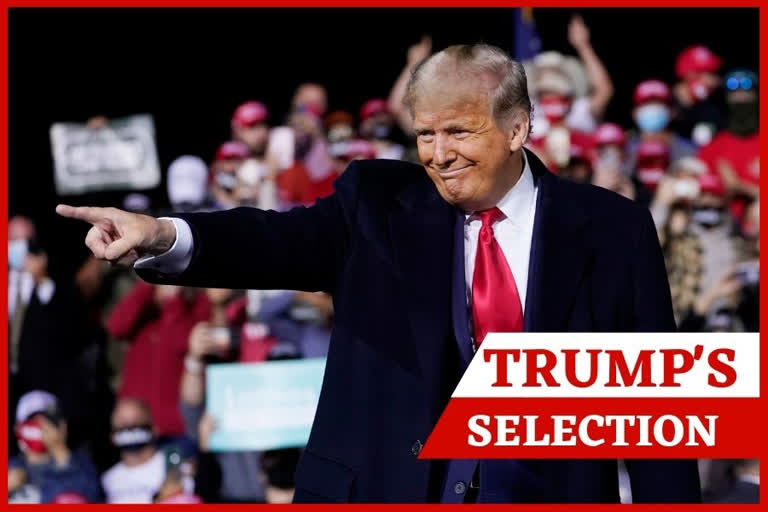Washington: President Donald Trump is promising to put forth a female nominee in the coming week to fill the Supreme Court vacancy created by the death of Justice Ruth Bader Ginsburg, pushing the Republican-controlled Senate to consider the pick without delay.
Taking the stage Saturday night at a North Carolina rally to chants of 'Fill that seat,' the president said he would nominate his selection despite Democrats' objections. And, after conducting what he joked was a 'very scientific poll' of the Fayetteville crowd as to whether supporters wanted a man or a woman, he declared the choice would be 'a very talented, very brilliant woman'.
He added that he did not yet know whom he would choose.
“We win an election and those are the consequences,” said the president, who then seemed to signal that he'd be willing to accept a vote on his nominee during the lame-duck period after the election. “We have a lot of time. We have plenty of time. We're talking about January 20th."
But one Republican senator had already broken ranks. Maine’s Susan Collins, who is in a tough reelection battle, said earlier Saturday that she believed replacing Ginsburg should be the decision of the president who is elected November 3. Three more defections from the GOP ranks would be needed to stop Trump’s nominee from joining the court.
At stake is a seat held by a justice who was a champion of women's rights and spent her final years on the bench as the unquestioned leader of the court’s liberal wing. Senate Majority Leader Mitch McConnell, R-Ky. vowed to call a vote for Trump’s nominee, but Democrats countered that Republicans should follow the precedent that GOP legislators set in 2016 by refusing to consider a Supreme Court choice in the run-up to an election.
The impending clash over the vacant seat when to fill it and with whom scrambles the stretch run of a presidential race for a nation already reeling from the pandemic that has killed nearly 2,00,000 people, left millions unemployed and heightened partisan tensions and anger.
Read more:Know US Supreme Court judge, whose death can reshape election
McConnell pledged to Trump in a phone call Friday night to bring the choice to a vote though he has not said if it would be before the election.
Democratic presidential nominee Joe Biden said any selection should come after November 3. “Voters should pick the president and the president should pick the justice to consider,” he said. Biden has promised to nominate a Black woman to the high court if given the chance, but he has said he will not release names of possible nominees before the election.
Trump this month added 20 more names to his roster of potential court nominees, and aides in recent days have focused on a shortlist heavy on female candidates, according to four White House aides and officials close to the process. They spoke on condition of anonymity because they were not authorized to publicly discuss private conversations.
Those under close consideration for the high court include three women who are federal appeals court judges: Amy Coney Barrett, beloved among conservatives and an early favourite; Barbara Lagoa, who is Hispanic and comes from the battleground state of Florida; and Allison Jones Rushing, who clerked for Justice Clarence Thomas and for Neil Gorsuch when the current Trump-appointed justice was an appeals court judge.
At least one man, appeals court Judge Amul Thapar, has also been under consideration. A McConnell ally from Kentucky, he has been screened by Trump’s team for past openings and he would be the first Asian American on the high court.
McConnell, who sets the calendar in the Senate and has made judicial appointments his priority, declared unequivocally in a statement that Trump’s nominee would receive a confirmation vote. In 2016, McConnell refused to consider President Barack Obama’s nominee months before the election, eventually preventing a vote on Judge Merrick Garland.
Senate Democratic leader Chuck Schumer of New York convened a conference call with Democratic senators at midday Saturday, according to a person on the private call who was not authorized to discuss it publicly and spoke on condition of anonymity. He told senators the “No. 1 goal” must be to communicate the stakes of the confirmation vote.
Schumer also warned that if Republicans push through the nominee, “nothing is off the table” for Senate rules changes to come, the person said.
